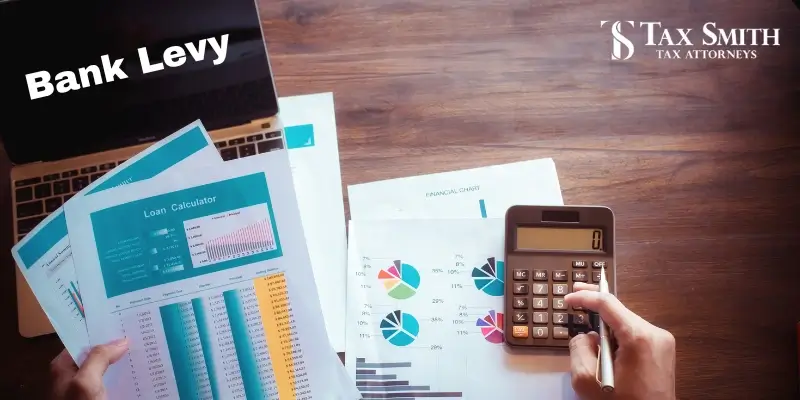1548 The Greens Way – Ste. 4 Jacksonville Beach FL 32250
St. Augustine Bank Levy Attorney
St. Augustine Bank Levy Lawyer
If you receive news a creditor is planning to conduct a bank levy, you’ll likely be emotionally distressed and unsure of how to proceed. In this stressful situation, you need to know what to do to keep cool-headed and speak with someone who can help.
If you are facing a bank levy or one has happened to a loved one, you need to speak with a St. Augustine, FL, bank levy attorney and law firm to help. It’s important to get legal guidance, and a trusted IRS tax attorney in St. Augustine can provide the support you need. At TaxSmith, we can help with tax and debt issues you are facing and give you legal counsel from a place of experience.

Can TaxSmith Help With My Florida Bank Levy?
At TaxSmith, we have experience working with clients with numerous issues related to taxes and the IRS. Our lead attorney, Angie Smith, is ready to help a client on the client’s terms and will make her schedule flexible to fit within a client’s life. We also offer an initial consultation at TaxSmith, so you can have a good idea of how we can help before enlisting our services.
Bank Levy: The Basics
A bank levy is a tool most creditors have access to when someone has unpaid debts with them. We see bank levies most often from the IRS, but private creditors can also make use of them against individuals with a debt.
When the IRS wants to recuperate unpaid back taxes, they can place a levy on your bank account to try and gain the funds. The IRS freezes the account and then takes any money in it to make up for any taxes the individual or business owes the organization.
The IRS will not place a levy on your bank account out of the blue; they will first deliver a notice to the person or business of the plan to place a levy on the account. The debtor typically has 30 days to contact the IRS or other creditors and make things right before the levy goes into effect.
If the debtor does not act or pay back the money, the creditor can go to a judge and ask for a levy order. This process is legal and will allow the creditor to seize assets from a debtor’s bank account. The creditor must show they provided fair warning and tried every other option before moving to a bank levy.
Once the order is in place, the bank will notify the debtor of the levy. The creditor will then seize any funds they need after another waiting period, typically around two weeks. During the final waiting period, the debtor has one more chance to do something before the creditor seizes funds.
How Can I Prevent a Bank Levy?
The easiest way to prevent a bank levy is to avoid debt to a creditor. If you already owe money, you have a few avenues to avoid the levy. You or your attorney can negotiate with your creditor to work out a payment settlement. You might convince the IRS to allow you to pay a small amount monthly until you erase the debt.
A creditor may also accept a settlement with wage garnishment. In this scenario, you will pay the creditor a portion of your paycheck until you pay back the debt. Your employer will automatically deduct the payment, similar to the way they take taxes out of your paycheck each payday.
Bankruptcy is also an option for avoiding bank levies, but you should consider it a last resort. Bankruptcy has long-term consequences that will affect you and your credit.
Do I Need an Attorney During a St. Augustine Bank Levy?
Creditors have plenty of power, especially when they seek to use a bank levy. An attorney can step in and try to negotiate with your creditor or the IRS and come to a more reasonable solution rather than the extremes of a bank levy. Your attorney can give you an idea of what the smartest course of action is, whether it is to make a settlement or find another payment method.

FAQs About St. Augustine, FL Bank Levy Laws
How Do I Get My Bank Levy Lifted?
You can remove a bank levy by paying your debts in St.Augustine, Fl, contacting the creditor and trying to work out a settlement plan, offering wage garnishments to your creditor, or filing for bankruptcy. There’s no one perfect plan, so you should speak with an attorney to develop a strategy to deal with your debts. The most important thing to do when facing a bank levy is to remain calm and not panic.
Can I Dispute a Bank Levy?
It’s difficult to dispute a bank levy, especially when the IRS is involved. If you do not owe any debts, you can prove the creditor made a mistake and use any documents you have to support your claim. You could also demonstrate you were the victim of identity theft and that the debt is not yours. The easiest way to stop a bank levy is to negotiate a settlement with the IRS for a payment plan.
How Long Does a Bank Hold a Levy?
Your creditor will likely hold the levy until they collect enough money to wipe away the debt. If the account does not have enough money to support the debt, the creditor can move to levy additional accounts. You can also file for bankruptcy or negotiate with the creditor to remove the levy.
Do Banks Charge a Levy Fee?
The bank can charge a fee to any customer dealing with a bank levy. Not every bank charges a levy fee, but most will do so when they have to go through the work to put a levy on an account. A levy fee is just another stressor to deal with when the IRS or a creditor tries to seek restitution for lack of payment.
TaxSmith: Experienced Tax Attorneys
Tax law is complicated to work through, and a bank levy will leave you in a place of worry as you try to solve the issue. We can help at TaxSmith. Contact us today for a consultation.
Locations We Serve
- Alabama
- Arizona
- California
- Colorado
- Connecticut
- Delaware
- District of Columbia
- Florida – HQ
- Georgia
- Idaho
- Illinois
- Indiana
REQUEST A CONSULTATION
Please fill out the Contact Request Form and a Tax Attorney/Paralegal will call you
to discuss legal representation or to schedule your free initial consultation





